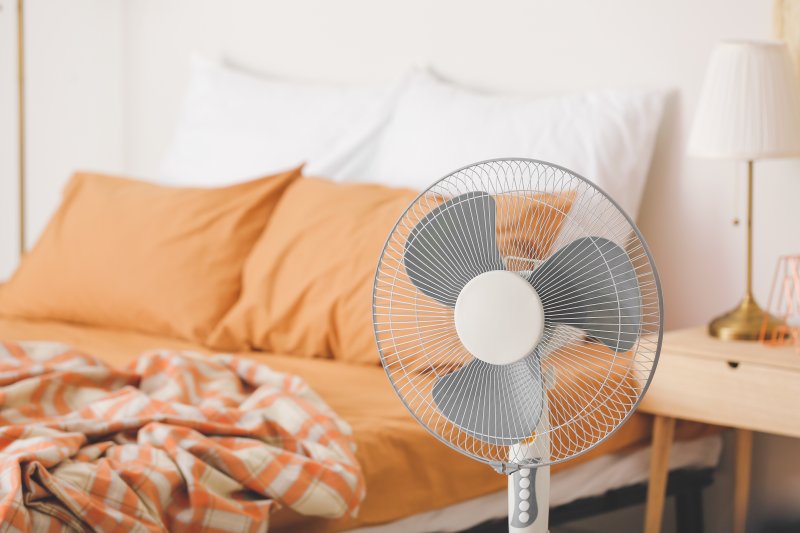
With summer approaching, one of the biggest barriers to getting a good night’s sleep is increased temperatures in the bedroom. A 2010 poll by the National Sleep Foundation found that nearly 70% of respondents reported that temperature plays a big role in their sleep quality.
Luckily, there are many ways to cool your bedroom in order to enjoy uninterrupted sleep even throughout the warmest months of the year.
The Science Behind Keeping Our Bodies Cool
Your body has three ways of cooling itself down:
- Convection happens when the air surrounding your body moves heat away from you. This is most likely to happen when the temperature of the room is cooler than your skin.
- Radiation happens when heat moves between your body and other nearby objects. When the objects around you are cooler than your skin, heat from your body will naturally warm up the object (like your mattress or pillow).
- Perspiration, also known as sweating, is a way that the body reduces its internal temperature. When you sweat, it evaporates, which pulls heat away from your body.
When you’re in a hot room, it’s harder for convection and radiation to happen in your body in order to cool down. Additionally, in humid climates, perspiration becomes less effective, as it is harder for sweat to evaporate.
Tips for Keeping Cool
If you have air conditioning, getting to sleep in the summertime may feel like a breeze. However, many do not have this luxury, so knowing the best tactics for cooling a room before bedtime is essential.
Limit Heat Buildup
- Lower your blinds and close your windows and doors during the day to keep natural sunlight and hot air from infiltrating your space.
- Consider replacing any incandescent light bulbs in your overhead lights and lamps. These bulbs give off a lot of heat and replacing them with energy-efficient bulbs can help.
- Decrease the use of hot kitchen appliances. The oven and stove can give off a lot of heat and warm your home. Instead, use smaller appliances like pressure cookers and air fryers, or grilling outdoors.
Cool It Down
- When the temperatures drop at night, create ventilation that brings in as much cool air as possible. Creating a cross-breeze can help circulate cool air through the bedroom.
- Use fans in combination with creating a cross-breeze. If you have two fans, you can position one to pull air in a window, and one to push air out of another window to maximize ventilation.
- Sleep in lightweight clothing so that air can circulate around your skin.
- Invest in bedding that is breathable and sweat wicking. Materials like percale cotton, Tencel, or bamboo-rayon are great options.
- Freezers can be a great solution to staying cool. Use ice packs in bed on your head, neck, or wrist to lower your external body temperature.
- Cold showers can provide an easy way to cool down before bed.
When Keeping It Cool is Not Enough
Making these easy adjustments can help you stay cool and sleep better throughout the hot summer months. If making these changes isn’t improving your sleep health, and you’re experiencing symptoms of sleep apnea like snoring, daytime sleepiness, or morning headaches, it may be time to have a sleep apnea screening.
If you live in the Atlanta area, Dr. Jeff Rodgers is here to help. He is a sleep medicine practitioner with over two decades of experience, and he can provide custom-made oral appliances that allow patients to breathe easier and sleep better no matter the time of year. Request an appointment today to learn more about treating obstructive sleep apnea.
